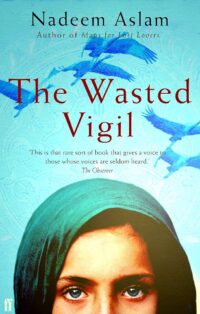Book review: The Wasted Vigil by Nadeem Aslam
 For a country that has featured so heavily in major news events in my lifetime, I have read very few books set in Afghanistan. The Wasted Vigil by Nadeem Aslam is not only set in Afghanistan, it also covers many of those same major world events. I adored his first book Maps For Lost Lovers and this was his follow-up.
For a country that has featured so heavily in major news events in my lifetime, I have read very few books set in Afghanistan. The Wasted Vigil by Nadeem Aslam is not only set in Afghanistan, it also covers many of those same major world events. I adored his first book Maps For Lost Lovers and this was his follow-up.
It’s shortly post-9/11. Marcus is an English doctor who has spent most of his life living at the edge of a village near Jalalabad. His progressive, outspoken Afghani wife Qatrina was murdered by the Taliban. Now the Taliban have moved on from the area but two local warlords are sparring for control. A disparate group of people find their way to Marcus’s house. He, meanwhile, is mainly waiting for news of his daughter Zameen who disappeared during the Soviet invasion. Or if she hasn’t survived, perhaps he can at least find the son she is rumoured to have had.
“She looks at the moon caught in a windowpane, great in size and brightness both. It seems that to shatter it would be to flood this room and then the entire garden and orchard with luminous liquid. In the 1950s, when the Soviet Union was ahead of the United States in the space race, the US Air Force had asked scientists to plan a nuclear explosion on the moon…Moscow had also had the idea…It never happened but she wonders if the terrorists didn’t come close to something like it in 2001, an enormous spectacle seen by the entire world, planting awe and shock in every heart.”
Lara is a Russian woman looking for evidence of her soldier brother Benedikt who went AWOL decades ago during the Soviet–Afghan War. David is an American former spy who has been helping Marcus figure out what happened to Zameen, who he knew briefly in Peshawar. Casa is a young Afghani whose hatred of the West plunges him into the depths of zealotry. And James is a Special Forces soldier who doesn’t question the dangerous role his country has played in Afghanistan.
Most of the action is centred around Marcus’s home. Aslam describes it in great detail, particularly the murals that Qatrina painted in every room. These artworks represent the five senses and are both religious and sensual in nature. When the Taliban occupied the region, Marcus covered the walls with mud so that the house wouldn’t be destroyed. His and Qatrina’s extensive book collection has been pinned to the ceilings for the same reason. In the grounds of the house is a former perfume factory, buried underground to keep the delicate ingredients cool and now occupied by the head of a large Buddha statue leftover from the town’s Buddhist past. It’s a wonderfully romantic setting for a story that is emphatically not a romance. It’s an examination of the effects of war, occupation and imperialism.
“This country was one of the great tragedies of the age. Torn to pieces by the many hands of war, by the various hatreds and failings of the world. Two million deaths over the past quarter-century. Several of the lovers on the walls were on their own because of the obliterating impact of the bullets – nothing but a gash or a terrible ripping away where the corresponding man or woman used to be. A shredded limb, a lost eye.”
Flashbacks fill in the links between the characters, particularly what happened to Zameen and Benedikt. The truth isn’t always easy; in fact, it’s usually not. Aslam’s language is gorgeous but I found this novel unbearably sad.
Published 2008 by Faber & Faber.